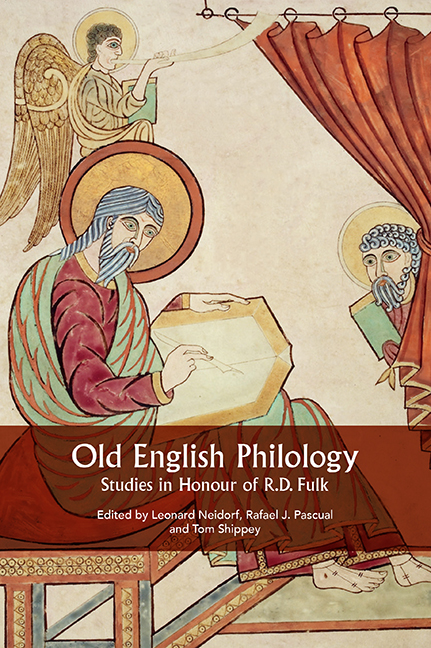Book contents
- Frontmatter
- Contents
- List of Illustrations
- Acknowledgements
- List of Contributors
- Introduction: R.D. Fulk and the Progress of Philology
- 1 Sievers, Bliss, Fulk, and Old English Metrical Theory
- 2 Ictus as Stress or Length: The Effect of Tempo
- 3 Metrical Criteria for the Emendation of Old English Poetic Texts
- 4 The Suppression of the Subjunctive in Beowulf: A Metrical Explanation
- 5 Metrical Complexity and Verse Placement in Beowulf
- 6 Alliterating Finite Verbs and the Origin of Rank in Old English Poetry
- 7 Prosody-Meter Correspondences in Late Old English and Poema Morale
- 8 The Syntax of Old English Poetry and the Dating of Beowulf
- 9 The Anglo-Saxons and Superbia: Finding a Word for it
- 10 Old English gelōme, gelōma, Modern English loom, lame, and Their Kin
- 11 Worm: A Lexical Approach to the Beowulf Manuscript
- 12 Wulfstan, Episcopal Authority, and the Handbook for the Use of a Confessor
- 13 Some Observations on e-caudata in Old English Texts
- 14 The Poetics of Poetic Words in Old English
- 15 Dream of the Rood 9b: A Cross as an Angel?
- 16 The Fate of Lot’s Wife: A ‘Canterbury School’ Gloss in Genesis A
- 17 Metrical Alternation in The Fortunes of Men
- 18 The Originality of Andreas
- 19 The Economy of Beowulf
- 20 Beowulf Studies from Tolkien to Fulk
- The Writings of R.D. Fulk
- Index
- Tabula Gratulatoria
- Anglo-Saxon Studies
4 - The Suppression of the Subjunctive in Beowulf: A Metrical Explanation
Published online by Cambridge University Press: 29 May 2021
- Frontmatter
- Contents
- List of Illustrations
- Acknowledgements
- List of Contributors
- Introduction: R.D. Fulk and the Progress of Philology
- 1 Sievers, Bliss, Fulk, and Old English Metrical Theory
- 2 Ictus as Stress or Length: The Effect of Tempo
- 3 Metrical Criteria for the Emendation of Old English Poetic Texts
- 4 The Suppression of the Subjunctive in Beowulf: A Metrical Explanation
- 5 Metrical Complexity and Verse Placement in Beowulf
- 6 Alliterating Finite Verbs and the Origin of Rank in Old English Poetry
- 7 Prosody-Meter Correspondences in Late Old English and Poema Morale
- 8 The Syntax of Old English Poetry and the Dating of Beowulf
- 9 The Anglo-Saxons and Superbia: Finding a Word for it
- 10 Old English gelōme, gelōma, Modern English loom, lame, and Their Kin
- 11 Worm: A Lexical Approach to the Beowulf Manuscript
- 12 Wulfstan, Episcopal Authority, and the Handbook for the Use of a Confessor
- 13 Some Observations on e-caudata in Old English Texts
- 14 The Poetics of Poetic Words in Old English
- 15 Dream of the Rood 9b: A Cross as an Angel?
- 16 The Fate of Lot’s Wife: A ‘Canterbury School’ Gloss in Genesis A
- 17 Metrical Alternation in The Fortunes of Men
- 18 The Originality of Andreas
- 19 The Economy of Beowulf
- 20 Beowulf Studies from Tolkien to Fulk
- The Writings of R.D. Fulk
- Index
- Tabula Gratulatoria
- Anglo-Saxon Studies
Summary
In Old English, concessive clauses introduced by the conjunction þēah (þe) are almost always associated with the subjunctive mood. According to Burnham (1911: 24), the prose texts provide 693 instances of the þēah-clause where only 10 (1.4%) are in indicative mood. In a work intended as a companion volume to Burnham's monograph, Quirk (1954: 31, 33) made a comprehensive study of concessive clauses in Old English verse texts, stating that “the mood of verbs in dependent þēah-members is overwhelmingly subjunctive”: of 223 finite verbs in the þēah (te)-clauses, 127 are clearly subjunctive, 87 are ambiguous, and 9 are indicative, of which Quirk dismisses four problematic cases to reach “five unchallenged instances of indicative, … that is, 2.2 per cent of the total of the verbs in dependent þēah-members.” A preponderance of the subjunctive in the þēah-clauses can, for instance, be seen in Beowulf: there occur 27 instances of the þēah-clause, only two of which contain verbs unambiguously in indicative mood (hereafter emphasis in quotations mine):
Ne nōm hē in þǣm wīcum, Weder-Gēata lēod,
māemǣhta mā, þēh hē þǣr monige geseah (Beo 1612–13)
[He, the prince of the Weder-Geats, did not take any more precious
objects from that dwelling, although he saw many there]
nō ðȳ ǣr hē þone heaðorinc hatian ne meahte
lāðum dǣdum, þēah him lēof ne wæs. (Beo 2466–7)
[yet he (=Hrethel) could not persecute the battle-warrior (=Hæthcyn) with hateful deeds, although (Hæthcyn) was not dear to him (=Hrethel)]
In both of the instances, the þēah-clause describes a fact. But, as Campbell (1956: 65) states, “[þ]ēah takes the subjunctive in subordinate clauses by rule, and quite independently of the reality of the concession.” In the verse below, which looks very much similar to verse 2467b in wording as well as in meaning, the poet used the subjunctive wǣre in the þēah-clause with reference to a fact:
þēah hē him lēof wǣre (Beo 203b)
[though he (=Beowulf) was dear to them]
Meter affords the key to the use of the indicative in verses 1613b and 2467b.
- Type
- Chapter
- Information
- Old English PhilologyStudies in Honour of R.D. Fulk, pp. 69 - 81Publisher: Boydell & BrewerPrint publication year: 2016
- 1
- Cited by



